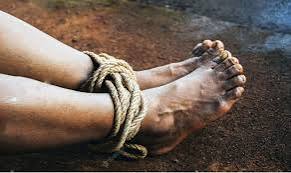News
Reasons Why the Buhari Administration Released 101 ‘Notorious Boko Haram’ Suspects From Kirikiri

Ibekimi Oriamaja Reports
Details have emerged as to why 101 Boko Haram suspects were recently released from correctional facilities in Lagos State, including the Kirikiri maximum and medium facilities.
According to Track News, an insider told FIJ last Sunday that wardens at the facility allegedly released the terrorists from the medium and maximum security facilities as part of a swap deal with the terrorists in exchange for the release of travellers abducted in Kaduna on March 28.
According to the source, the terrorists discussed their release before a new administration took over.
According to the source, the released terrorists were aware of the Kuje jailbreak, which resulted in the release of over 60 feared terrorists.
Exchange of Prisoners
However, according to report, an out-of-court settlement facilitated the recent release of 101 ‘Boko Haram’ suspects arrested in various locations in 2009.
According to sources, discussions for the suspects’ release began long ago when it became clear that there were no facts to prove that they were Boko Haram members, despite the fact that the majority of them were arrested in the streets of various cities at the start of the Boko Haram uprising 13 years ago.
Remember that General Lucky Irabor, the Chief of Defence Staff, told journalists on Friday, “… Perhaps at this point, what I may need to add is that Council was also briefed that 101 ex-combatants were taken to Operation Safe Corridor (in Gombe) and are currently undergoing the process of de-radicalization at the center.”
“These were ex-combatants who had been detained for several years, some of whom had served their sentences.” Others were those who were awaiting trial, but because of their long involvement and in accordance with the protocol or procedure for dealing with anyone who has been exposed to terrorism or related offenses, the procedure for them to be taken through a de-radicalization process.”
The applicants’ agreement, signed by the Attorney-General of the Federation, the respondents, and the Legal Aid Council, which represented the applicants, was approved and adopted as a judgment before three separate High Court judges in Lagos.
According to a document made available on Saturday, the orders for their release were issued on October 4 and 5 by Justices Awogboro Olawunmi, Tijjani Garba Ringim, and Nicholas Oweibo.
Detention and Raid
The suspects were detained after being arrested on suspicion of being Boko Haram members in Bauchi, Maiduguri, and Kano in 2009.
This occurred when police and other security agencies launched operations to quell the uprising led by Boko Haram members led by Mohammed Yusuf.
The suspects had been detained since then, with no hope of release until recently.
“The alleged prisoner swap contains not a shred of truth.” The terrorists who released the final batch of train victims have nothing to do with the 101 people who were released from Kirikiri. Those in Kirikiri were not members of Boko Haram. There was no evidence to hold them accountable.
“During the invasion of Kuje prison in Abuja, the terrorists who attacked the Abuja-Kaduna train released their members.” Terrorists place no value on those who have been liberated from Kirikiri. “It was just a coincidence that their release nearly coincided with the release of the train victims,” a military source in Maiduguri, Borno State, said.
An official with the Legal Aid Council also stated that the detainees were arrested by police in Maiduguri, Kano, and Bauchi states.
“Some of the suspects were apprehended during police raids on their homes, business premises, mosques, or highways,” he said.
“They were detained separately in Kano, Maiduguri, and Bauchi correctional facilities pending the time they would meet their bail conditions.” They were herded into a truck and moved to Lagos in March 2011.
“We have 74 detainees in Kirikiri Maximum Correctional Centre and 27 in Kirikiri Medium Correctional Centre,” he said.
Deradicalization and Debriefing
A top Council official denied a social media trending statement that their release was part of the terms of negotiations for the release of 23 Abuja-Kaduna train hostages.
“This is nonsense. It is a tissue of deception. They were released pursuant to a court order,” the official, who requested anonymity, told the Daily Trust on Saturday.
He also confirmed that the military took them to Gombe for debriefing and deradicalization after their release.
-

 Politics5 days ago
Politics5 days agoJUST-IN: George Turnah Welcomes Isaac Amakuro’s Disassociation from G-House Political Family
-

 News7 days ago
News7 days agoJUST-IN: Police declare Portable wanted, slam attempted murder and four other alleged offences on him
-

 Breaking News7 days ago
Breaking News7 days agoEdwin Clark dies at 97
-

 Politics7 days ago
Politics7 days agoYou Have 72hurs To Resign Your Appointments From Gov Diri’s Govt: Alabh George Turnah Tells Loyalist.
-

 National6 days ago
National6 days agoNigerian Cybercrime Police Centre Summons UK-Based Blogger Over Sowore Birthday Post
-

 News6 days ago
News6 days agoDr. Ken Robinson: My Message On The Passing Of Chief Edwin Kiagbodo Clark
-

 Politics7 days ago
Politics7 days agoUPDATE: Confusion as Newly Elected LAHA Speaker, Meranda Reportedly Resigns
-

 Crime6 days ago
Crime6 days agoTwo residents of FCT killed by kidnappers due to delays in paying their ransom




